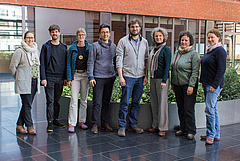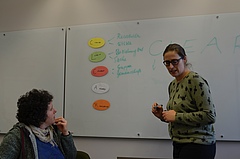28.02.2018 | TOP NEWS, Biodiversity and People
Workshop on the role of storytelling in Citizen Science

The workshop participants (from left): Anett Richter, Steffen Klotz, Andrea Sieber, Jörg Zabel, David Ziegler, Susanne Hecker, Didone Frigerio, Victoria Miczajka-Russmann (photo: Stefan Bernhardt).

Anett Richter and Didone Frigerio during development of a new model on storytelling in Citizen Science (photo: Andrea Sieber).
Note for the media: Use of the pictures provided by iDiv is permitted for reports related to this media release only, and under the condition that credit is given to the picture originator.
Under the keywords "People-Places-Stories", scientists from Austria and UFZ/iDiv have analysed the role of narration in Citizen Science
Leipzig. When citizens participate in scientific research ('Citizen Science'), storytelling often plays an important role. From 23 February to 2 March 2018, two researchers from Austria visit the Department of Ecosystem Services with a COST Action grant in order to investigate the significance of storytelling for Citizen Science in more detail together with scientists from UFZ and iDiv. Other experts from the fields of Citizen Science and didactics also took part in a one-day workshop.By Dr. Anett Richter (scientist at UFZ/iDiv)
Stories direct attention, emotions and understanding. The narrative method "storytelling" in Citizen Science practice, as well as for scientific analysis, means "narrating into history" rather than "telling and listening to history". The scientific analysis of the relevance of storytelling for Citizen Science projects combined with the development of a common model for the application of the narrative method in different scientific fields (from social sciences to natural sciences and educational sciences) is the goal of a ten-day COST Action research visit by Dr. Didone Frigerio (University of Vienna) and Dipl. Ing. Andrea Sieber MA MA (Alpen-Adria-Universität Klagenfurt) in the working group of Prof. Aletta Bonn and myself (Department Ecosystem Services at UFZ/iDiv). We also hosted a workshop in which we invited other experts from the natural and social sciences to present their work and discuss the relationship between storytelling and "narration", the possible uses of narration as well as the untapped potential of narration in Citizen Science activities. Overall, the participants agreed on the fact that storytelling in Citizen Science can occur in different research phases and is a core element of the process. In addition, storytelling is multifunctional, since it is used both as an object (e. g., stories as a knowledge carrier/data source) and as a method (e. g., internal/external communication). This approach will be examined in more depth over the next few weeks and a scientific publication will be prepared. Biologist Victoria Miczajka-Russmann (Leipzig University, Educational Sciences) reported on her experiences with primary school children as ecosystem researchers. Prof. Jörg Zabel (Leipzig University, Biology Didactics) highlighted the significant role of stories in conveying scientific facts, for example with respect to evolutionary biology, to high school students. PhD student Andrea Sieber (University of Klagenfurt, Institute for Teaching and School Development) elucidated the important role of the listener in storytelling and shared her experiences from her research in the Lesach Valley in Austria on oral history for recording and transferring intangible cultural heritage with different generations. In her projects, Andrea applies narratives as core elements of participatory research with citizens in all research phases. Storytelling is a subject of the survey by means of writing calls, narrative cafés, intergenerational interviews and other formats, as well as by means of presenting the results creatively and performatively, for example in the form of animated films, raps, or exhibitions on research findings. Dr. Didone Frigerio (University of Vienna, Konrad Lorenz Research Centre for Behavioural and Cognitive Biology) applies storytelling as a tool for science communication in her research on behavioural biology. Her work was recently honoured with awards at the ‘Sparkling Science Slam’. The discussion was further enriched by practical experiences with storytelling by David Ziegler (Platform BürgerschaffenWissen, Museum für Naturkunde Berlin) and Steffen Klotz (Thünen-Institut, Mecklenburg-Western Pomerania) from the fields of community research and research in rural areas (project “Landinventur”). Susanne Hecker (UFZ/ iDiv) contributed to the discussion with perspectives from the field of science communication and provided insights into the current scientific discourse in storytelling. Susanne Hecker's doctoral thesis deals with questions at the interface between science communication and Citizen Science. My motivation to support the research stay of Andrea Sieber and Didone Frigerio was that both colleagues already use storytelling in Citizen Science successfully and that the reported added value of this approach coincides with my own experiences. In my observation, Citizen Science lives through the manifold stories. It is only through narration and listening that it is possible to lead a dialogue at eye level. Based on the experiences and examples, it was found that storytelling is multifunctional and vivid in its application. A systematic study of the applicability of storytelling in scientific processes and Citizen Science activities will be considered and presented at the second European Citizen Science Conference in summer 2018. Anett Richter (UFZ/iDiv)Further information: Projects of Andrea Sieber in the Lesach Valley (Carinthia, Austria):www.lesachtalerbrot.wordpress.com
www.lesachtalerflachs.wordpress.com Didone Frigerio's project for the "Sparkling Science Slam" (Austria):
www.youtube.com/watch?v=6UlIIvdgD8M COST Action Program:
http://www.cost.eu/COST_Actions/ca/CA15212 Conference of the European Citizen Science Association (ECSA) 2018:
www.ecsa-conference.euContact: Dr. Anett Richter
Postdoctoral researcher at the Department Ecosystem Services
Helmholtz Centre for Environmental Research – UFZ
German Centre for Integrative Biodiversity Research (iDiv)
Email: anett.richter@idiv.de
Phone: 0341 9733145
